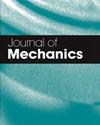The CFD Simulation of E1619 Propeller Open Water Tests Validated by the EFD in the NCKU Towing Tank
IF 1.8
4区 工程技术
Q3 MECHANICS
引用次数: 0
Abstract
This study established a Computational Fluid Dynamics (CFD) model based on a dynamic mesh strategy to conduct a comprehensive numerical investigation of the performance of the E1619 propeller in open water tests. To capture the turbulence flows around the propeller, a large eddy simulation (LES) turbulence model was implemented. In order to validate the simulation results, a series of open water tests were conducted in the towing tank at National Cheng Kung University, resulting in a successful achievement of total uncertainties of less than approximately 6%. The approach of simultaneous grid and time refinement was utilized to perform the discretization analysis. Eventually, the simulation results were employed to analyze the hydrodynamic performance and flow structure around the propeller, resulting in a conclusion based on the attained level of accuracy. The results indicate that the cases for a propeller with a strut exhibit favorable predictions compared to those of a single propeller, with error values for the thrust coefficients and propeller efficiencies falling below 6%. On the other hand, the torque coefficient was more accurately estimated for the cases of a single propeller than for those of a propeller with a strut, with error values below 2%.EFD在NCKU拖曳槽中验证的E1619螺旋桨开水试验的CFD模拟
本研究建立了基于动态网格策略的计算流体动力学(CFD)模型,对 E1619 螺旋桨在开放水域测试中的性能进行了全面的数值研究。为了捕捉螺旋桨周围的湍流,采用了大涡流模拟(LES)湍流模型。为了验证模拟结果,在成功大学的拖曳水槽中进行了一系列开放水域测试,结果成功实现了总不确定性小于约 6%。在进行离散化分析时,采用了网格和时间同步细化的方法。最后,利用仿真结果分析了螺旋桨周围的流体力学性能和流动结构,并根据达到的精度水平得出结论。结果表明,与单螺旋桨相比,带支柱螺旋桨的情况显示出良好的预测效果,推力系数和螺旋桨效率的误差值低于 6%。另一方面,单螺旋桨情况下的扭矩系数比带支柱螺旋桨情况下的扭矩系数估算更准确,误差值低于 2%。
本文章由计算机程序翻译,如有差异,请以英文原文为准。
求助全文
约1分钟内获得全文
求助全文
来源期刊

Journal of Mechanics
物理-力学
CiteScore
3.20
自引率
11.80%
发文量
20
审稿时长
6 months
期刊介绍:
The objective of the Journal of Mechanics is to provide an international forum to foster exchange of ideas among mechanics communities in different parts of world. The Journal of Mechanics publishes original research in all fields of theoretical and applied mechanics. The Journal especially welcomes papers that are related to recent technological advances. The contributions, which may be analytical, experimental or numerical, should be of significance to the progress of mechanics. Papers which are merely illustrations of established principles and procedures will generally not be accepted. Reports that are of technical interest are published as short articles. Review articles are published only by invitation.
 求助内容:
求助内容: 应助结果提醒方式:
应助结果提醒方式:


